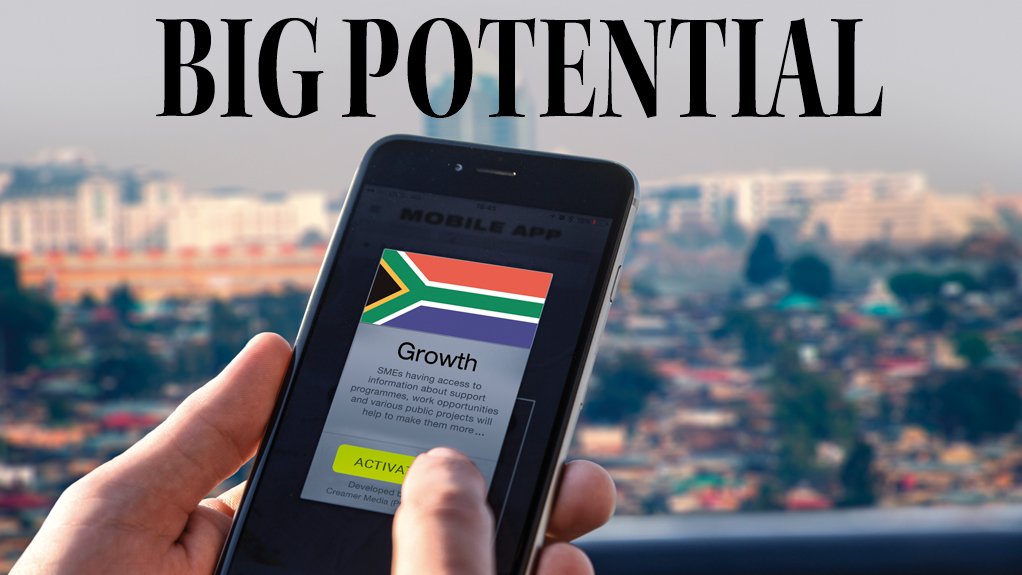The application (app) economy in South Africa can provide the benefits of mobility for many aspects of civil service and commerce, as well as support business growth and broader access to government resources.
However, the immaturity of the local app economy, compared with those in developed countries, is highlighted by naivety and expectations of large rewards for app development, based on a misconception of the role apps play in the economy.
South Africa lags far behind developed countries’ levels of development and use of apps and they typically exhibit massive activity around apps, says information technology (IT) research firm Worldwide Worx CEO Arthur Goldstuck.
The general immaturity of the app economy in South Africa is counterbalanced by many locally developed world-class apps by commercial ventures and independent developers, highlighting the potential use of apps to support economic activity and civil services, he states.
Johannesburg Centre for Software Engineering Applied Research Unit manager Adrian Schofield concurs, noting: “Most app development is done in corporate environments, not in the entrepreneurial market, as many tend to assume. The growth of apps in South Africa is largely driven [by] commercial funding that supports their development to meet business goals.”
However, such app development is not limited to commercial ventures and significant activity is underreported, he adds.
“Although there is a distinct lack of statistics on the app economy and activity in South Africa, developer challenges and events such as HackJozi attract dozens of entrepreneurs and developers and indicate that the app market in South Africa is in a growth phase,” says Schofield.
While a specific monetary figure could not be determined for the size of the app economy, the presence of 29-million smart devices in the hands of South African consumers is cited as a significant indicator of the potential growth of apps and their use in the country.
Goldstuck also notes that most new phones bought by consumers are smartphones, as the price point of entry-level smartphones (R500) has dropped sufficiently to put them within reach of any citizen who can afford a phone. The growth rate of the market is estimated at 20% a year.
Business Relevancy
Award-winning locally developed app CrashDetech founder and CEO Jaco Gerrits says that partnerships with businesses addressing established problems and optimising existing processes are often the most effective ways of developing successful and sustainable apps.
Goldstuck reinforces this view, highlighting that successful app developers often try to partner with companies or try to piggy-back on existing services and industries. However, this requires a good understanding of the industry in which the app will be used.
“There is a tremendous amount of business thinking that has to happen prior to successful app development and it requires cognisance of the business context in which the app is expected to function.
“Certain apps make a lot of sense to use, while others are only used in specific contexts or for specific purposes, such as public transport apps. Correctly determining the context and drivers underpinning the use of an app and when and how people will engage with it is therefore critical to determine the viability and business case for the app,” he emphasises.
“Successful app development is not about the idea, but about the execution of the idea. Also, more important than the idea, testing the assumptions one has against prospective users is necessary to determine business value and viability,” details Gerrits.
Testing is critical to determine whether assumptions are correct and adapt the solution to achieve a good market fit.
“It is the executive and the team behind the development of the app that will win over prospective investors, not the idea, and they expect and require that research has been done and the marketability proven,” he adds.
Schofield reinforces this view, noting that app developers will rarely be able to access funding without a marketable product, as is the case with any other product or service, and the chance of breaking into the market successfully without funding support of some kind is slim, he adds.
If entrepreneurial developers are without funding support, they should approach the incubators and technology hubs to use the resources available to turn the app into a marketable product, he says.
Goldstuck also encourages entrepreneurial developers to approach innovation hubs and co-creation spaces where they can access further training and technical support, as well as develop nontechnical business skills that are crucial for success.
Growth Potential
Gauteng Department of Economic Development (GDED) information and communication technology (ICT) and resource management head Lemmy Chappie says apps and mobile platforms, such as smartphones, reduce the costs of doing business and barriers to entry for small and medium-sized enterprises (SMEs), as well as enabling them to reach clients more effectively.
“The GDED sees apps as a very important channel that will play a significant role in the gross domestic product of Gauteng. The growth of smart devices enables broad SME creation and growth opportunities to be realised.”
He adds that provincial and national government should fulfil a leadership role in supporting the app economy. He highlights Gauteng’s support for SMEs through the Innovation Hub and its partnerships with multinational IT companies, including Microsoft and IBM, and development of its own civil service apps as examples of the types of roles government should play.
“The potential of mobile devices to reduce costs for businesses and citizens should not be under- estimated,” he says, stating that SMEs having access to information about support programmes, work opportunities and various public projects will help to make them more sustainable.
Further, data-free services, apps and platforms – such as government websites, SME business support forums and apps – that can be accessed without the user requiring mobile data or airtime are already helping to boost SME growth and access to business opportunities.
IT business solutions company Strato IT MD Cassie Lessing notes that apps enable users to reach beyond traditional business boundaries and to benefit from information services practically anywhere or at any time.
Government agencies and the public sector can benefit significantly from the adoption of mobile technologies, he avers.
“Many of the mandates and problems govern- ment is trying to resolve can be addressed [using] technical solutions. Government departments and local municipalities can uplift SMEs by crowdsourcing smaller jobs from them and by issuing tasks directly to business owners in their own districts through supply chain departments in partnership with app companies,” confirms artisanal services platform HelpOut marketing manager Colleen Arend.
Job creation and effective service delivery through technology can foster growth and development in local economies, she adds.
Social Uses
Chappie notes that app development has not reached its full potential in the South African economy, and that the opportunities for both business and social apps are significant. For example, there are some apps that help members of stokvels (which are peer savings aggregation initiatives) to track and manage their contributions.
“Such initiatives can help to reach the informal portions of the economy and improve their success, which, in turn, will help to develop and grow those portions.”
Further, a key benefit for government is the ability to derive meaningful and accurate information from apps for use in policymaking, interventions and support measures.
The potential for apps to improve processes and performance in just about every field of endeavour is significant, and this includes social issues such as health services, education and government services, says Schofield.
Public, social-issue and community apps are premised on broad adoption and use, rather than financial success. Therefore, developers who create apps to address social issues, such as those providing access to healthcare services, community safety or social security systems, must follow a different approach, says Goldstuck.
Social apps are typically free to use and developers can seek out either corporate social responsibility or government or nongovernmental organisation sponsorship once the app is established and frequently used.
However, this does not preclude commercial apps helping to address social challenges. The CrashDetech app, for example, deals with the significant social challenge of transport-related injuries and deaths, but does so from a commercial point of departure.
The app links medical insurance and medical emergency services and helps to improve their processes in a commercially viable and sustainable way.
Social-technology entrepreneurs have the opportunity to provide relevant solutions that bridge the gap between access and available services in a sustainable manner, which would boost socioeconomic development throughout the continent, says IT start-up incubator Seda Nelson Mandela Bay ICT Incubator enterprise development manager Scott Zambonini.
“There is no reason why South African developers cannot create relevant systems to benefit society and address social issues, while being commercially successful and sustainable,” he concludes.
Edited by: Martin Zhuwakinyu
Creamer Media Senior Deputy Editor
EMAIL THIS ARTICLE SAVE THIS ARTICLE
To subscribe email subscriptions@creamermedia.co.za or click here
To advertise email advertising@creamermedia.co.za or click here























